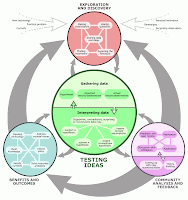With all of the attacks on the scientific community from various "denier" groups, I worry about the state of scientific literacy in the United States. I fear that too many people are scientifically illiterate and that their illiteracy is being leveraged against them. I want my students to be scientifically literate so that they can make intelligent, informed choices in their lives and not be misled by faulty evidence or illogic.
Understanding Science is an excellent, comprehensive resource for learning about and promoting scientific literacy. Produced by the UC Museum of Paleontology at the University of California at Berkeley, Its mission "is to provide a fun, accessible, and free resource that accurately communicates what science is and how it really works." With a variety of tools, resources, and lessons that span the K through 16 classroom, Understanding Science showcases the process of science.
I'd like to highlight two of my favorite resources from Understanding Science:
 |
| How Science Works flowchart from Understanding Science |
- The How Science Works flowchart is an interactive, graphical representation of the process of science and scientific inquiry. I provide a copy of this flowchart to each of my students and use it to frame all of our discussions and activities. Students begin to understand more deeply that science does not happen in a vacuum, that it follows a logical, iterative process, and that it is an ongoing and ever-changing endeavor.
- Asteroids and Dinosaurs is a lesson that nicely illustrates "how science works." Tracing the story of Luis and Walter Alvarez, Asteroids and Dinosaurs tell the incredible tale of the work involved in developing the link between asteroid impact and dinosaur extinction. It makes for a great beginning-of-year lesson on the nature of science that can be referenced time and again throughout the school year.
As a scientist and a science teacher, I feel it is imperative that we teach students how to be scientifically literate. While I don't expect all of my students to become scientists, I want them to enter the "real world" empowered with the critical thinking skills that are valued in science—many of which I see lacking in today's adults.
A favorite quote of mine from astrophysicist Neil deGrasse Tyson sums it up well: "If you're scientifically literate, the world looks very different to you, and that understanding empowers you."
No comments:
Post a Comment